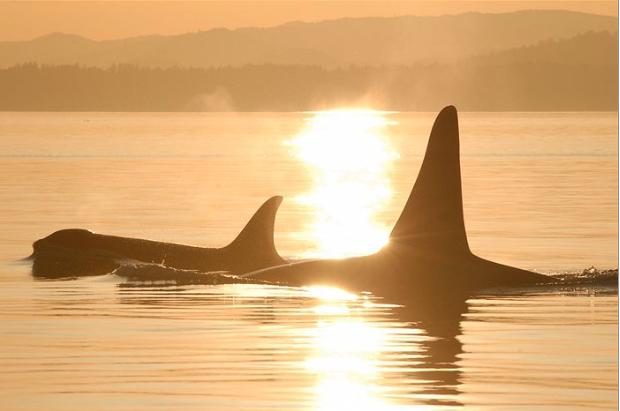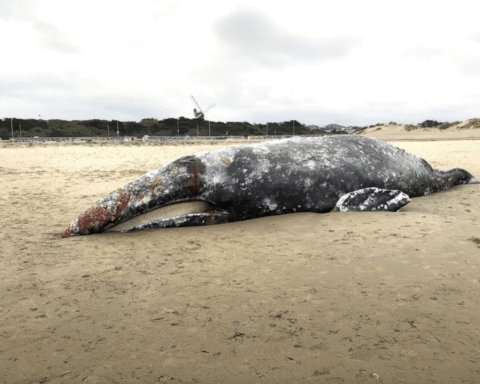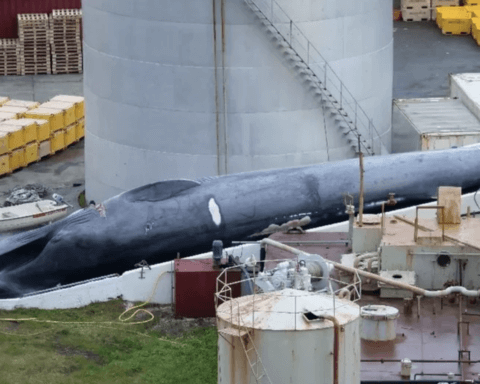*Over the weekend, Friday Harbor-based, Center for Whale Research, reported a missing Southern Resident orca, L92, presumed to be dead. That brings the critically endangered Southern Resident Salish Sea population down to 75, the lowest since 1984. It’s yet another man-made fiasco.
Allow me to remind you that we are amidst the human-driven Sixth Mass Extinction. It’s accelerating 1,000 to 10,000 times faster than the five other mass extinctions. This looting of Nature has collided with the horrendous man-made persistent organic pollutants and 300 zettajoules of fossil fuel ocean heat driving the climate crisis.
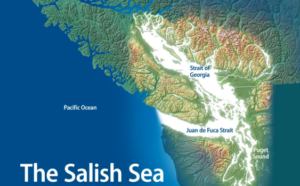
The Salish Sea is a picturesque network of Pacific coastal waterways along the southwestern coastline of British Columbia (BC), Canada, and the northwestern corner of the U.S. state of Washington (WA).
It’s awe-inspiring salmon, orcas, eagles, bears, cougars and temperate rainforests with gigantic trees are inexorably linked in Nature’s dance of survival.
Rapacious overfishing has decimated sockeye, Coho and Chinook salmon. Salmon, particularly Chinook, are a vital food source for the Southern Resident orcas.
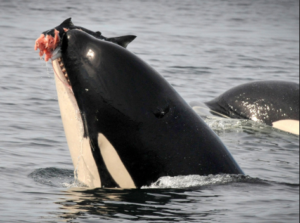
Photo credit: Oceana
Orcas are the largest of all the dolphins. Males can reach 29 feet and weigh and impressive 10 tons. Females are about 35 percent smaller. An orca has a brain that is three times larger than a human.
These highly intelligent and sentient Southern Resident mammals use sonar, or, echolocation, to find Chinook. It’s deadly accurate. For instance, an orca can locate a ping-pong ball 100 yards away in a split second.
Each creature has its own signature whistle, or, name. Its brain can astoundingly interpret 400 clicks per second. Orcas have triple the number of nerve fibers in each ear compared to all land animals. It’s the largest diameter nerve in any creature of any kind.
Orcas have more bandwith because they process vast amounts of acoustic information at very high speeds. In comparison, a human brain is like a dial-up modem at the inception of the Internet in the early 1990s. It’s quite plausible that these extraordinary dolphins are able to turn a beam of sound into an image. Oh my gosh.
Orcas spend their entire lives with their mothers in the same matriarch-driven pod.”
They interact with a few other pods to reproduce. Males rarely live beyond 50. Females, on the other hand, can live more than a century.
Female orcas undergo menopause around 45 years. The only other known mammals to do so are short-finned pilot whales and humans. Older orca females become excellent surrogate aunties.
The matriarch possesses ecological wisdom. She remembers food sources and guides her pod through lean times. The pod can hunt together similarly to a pack of wolves; hence the moniker, “wolves of the sea.”
The Southern Resident orcas are starving to death. Stocks of Chinook are gone. In the 1980s, six 50-pound Chinooks daily could feed a male. Today, if males can find them, they are more likely 10 pounds. That means they need 30 Chinooks a day. It takes a lot more energy to catch these small fish.
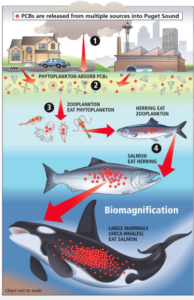
Photo credit: Washington government
The southern Salish Sea is a toxic soup. 106 publicly owned water-treatment facilities are annually releasing into the sea an estimated 48.5 tonsof pharmaceutical drugs such as opioids, Prozac, Lipitor, illegal drugs like cocaine and crystal-meth and persistent organic pollutants e.g., flame retardants and PCBs.
Starving orcas are now contending with metabolizing blubber, or, stored fat, laced with PCBs. This leads to higher absorption of lethal poisons. It significantly reduces successful pregnancies.

Photo credit: Ecowatch
It’s horrible right now in the Salish Sea. A warming world from burning subsidized fossil fuels has increased the intensity and duration of heatwaves and reduced the coastal mountain snowpacks. That means there is less water flowing during salmon migrations and water temperature is much warmer. Warm water holds less dissolved oxygen, making it very difficult for salmon to breathe.
Elevated water temperature increases salmon metabolism. Salmon must use more stored energy at a faster pace. This lessens their chance of enduring the rapid-fraught journey upstream to spawn. It’s now so hot that the salmon cannot even commence their life-sustaining journey.
Just south of the Salish Sea in the early summer of 2015, the Columbia River was 72 degrees Fahrenheit, five degrees above the 10-year average. 235,000 sockeye perished at the river’s mouth.
Northern Salish Sea salmon face an additional fatal hurtle. A deadly introduced fish farm virus has escaped into the wild. This hideous plague inflames their heart and skeletal muscles.
As if all of this were not enough to unthread the priceless tapestry of Salish Sea life, the subsidized Canadian Trans Mountain Pipeline, draining Alberta’s toxic tar sands into the port of Vancouver, BC, is the coup de grâce.
Supertanker traffic is poised to increase by 700 percent. The incessant cacophony from humongous supertanker propellers will drown the orca’s sonar. Orcas won’t find fish; these glorious masterpieces are doomed to extinction.
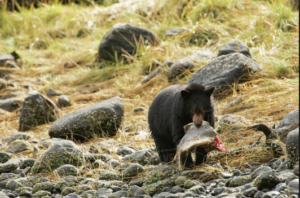
Photo credit: Steve Smith
Once upon a time, millions of salmon fed orcas, bears, eagles, river otters, beavers and even diminutive voles and shrews. Left over salmon carcasses decayed in rainforests and released nitrogen and other minerals enriching soils and roots of stupendous trees. Salmon fertilized these superb rainforests.
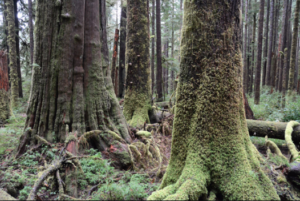
Photo credit: Al Jazeera
Today, what remains of the impoverished Salish Sea’s rainforests provides daily drinking water for Vancouver and Victoria, BC, and Seattle, WA. The catastrophic loss of the salmon jeopardizes both the quantity and quality of fresh water supplying seven million people.
This is a stark wake-up call. Nature has quickly unravelled! 7.6 billion procreating people cannot survive on our planet now unless each of us make a commitment to become a vegan and consume much less. Is anyone paying attention?
#FightForThePlanet
Please support Sea Shepherd, a direct -action conservation movement, because they’re protecting our friends – the orcas.
Dr Reese Halter is an award-winning broadcaster, distinguished conservation biologist and author.
Dr Reese Halter’s latest book is
Save Nature Now
Tweet @RelentlessReese
•••••••••••••••••••••••••••••••••••••••••••••

